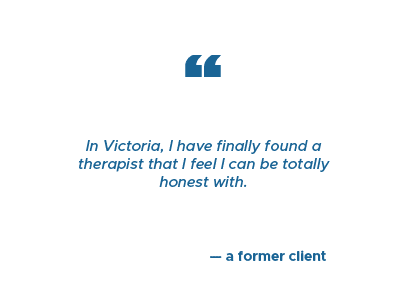Victoria is a psychotherapist at Wildflower. She earned her Master’s degree in Clinical Mental Health Counseling from Adler University and Bachelor’s degree in Finance from Villanova University. Victoria is an integrative therapist who calls on various therapeutic modalities, including Cognitive Behavioral Therapy and Acceptance and Commitment Therapy in her clinical work. Prior to becoming a therapist, she was involved in human resources, career advising, and coaching. Read Victoria’s full bio here.
What inspired you to pursue a career as a psychotherapist?
I spent most of my career working in human-centered professions, first in Human Resources and later in career counseling for college undergraduates. As a career counselor, I found resume reviews and job interview preparation often gave way to reveal students’ desires, pressures, and passions, sometimes wholly separate and distinct from the initial career path they planned to pursue. It was through these conversations, where career counseling revealed clients’ true motivations, that I realized my favorite part of the work was not necessarily helping craft the perfect resume, but rather helping my clients understand their underlying thoughts and feelings that ultimately drove their pursuits. I realized how closely linked this work was to mental health counseling and ultimately decided to pursue a career in psychotherapy.
As a psychotherapist, what part of your job is most satisfying?
By far the most satisfying part of my role is helping to support and facilitate client growth. I feel so humbled and privileged that clients trust me with their stories and experiences, and I strive to uphold and honor their journey. As a therapist, I am in a unique position to hear clients’ innermost thoughts and struggles and while that vulnerability can be difficult for clients to share, I feel heartened in those moments when a client finally expresses hopefulness and the possibility for a new chapter. As a therapist, I watch clients’ strength and resilience unfold and walk beside them as we share together in both their obstacles and successes.
How would you describe your therapeutic approach?
I tend to be active in session, clarifying, reflecting client’s emotional experiences, and providing interpretation as we work together. I strive to uphold Carl Rogers’ philosophy – taking a warm, non-judgmental, authentic and empathic approach for my clients to feel truly heard, understood, and accepted, exactly as they are that day, that hour, that exact moment in time. When appropriate, I often incorporate humor to remind clients I too am perfectly imperfect in my humanity (and my cheesy jokes!).
Why do you believe that psychotherapy can help?
For so many clients, therapy provides the space for a truly non-judgmental environment. My role is not to “fix” clients, but rather to help clients recognize and refine their internal and external resources to live a healthier, more manageable life, no matter what challenges life throws at them. I create this environment by building rapport, then by working collaboratively, encouraging, and even challenging clients in a respectful manner that may broaden their current perspective. Therapy provides a unique relationship between therapist and client, as it allows me to walk alongside my clients, helping them see and understand a full range of perspectives, rather than a singular point of view. There’s an ACT metaphor that describes this concept aptly – we’re both climbing our own mountains, and although from my view I might see things ahead that you cannot from your perspective, I’ve not yet reached the top of my mountain. I’m climbing with you, still making mistakes and learning from them. Together, we can get better at climbing and learning to appreciate our journey.
What are some of your specialties and what drew you to them?
I am drawn to mindfulness approaches, those that honor our emotional experiences, without attempting to avoid or fight against painful or difficult thoughts or feelings. We often attempt to rid ourselves of “negative” feelings, without respecting their value within our lives. Feelings are neither good nor bad, and I appreciate mindfulness approaches, especially Acceptance and Commitment Therapy, for its efforts in honoring and welcoming all parts of ourselves, without judgment or reproach.
What is one thing about psychotherapy you wish everyone knew?
Therapy is for everyone! We don’t have to wait until things fall apart before pursuing treatment. Therapy can provide insight, pragmatic life skills, and a safe space to explore our thoughts, feelings, and behaviors. Treatment can help clients gain insight to approach their lives with more clarity and direction. Mental health stigmatization is real, but normalizing and demystifying the process can allow for those experiencing all sorts of challenges to get help and evolve through the process.
What is your motto or personal mantra?
Hold the vision, trust the process. Growth and change don’t often occur overnight. New clients to therapy and those in distress often (and understandably!) want a quick fix, but rarely do those changes come immediately. Instead, catharsis evolves through a series of small breakthroughs. We are always evolving and when intentional, we can bring greater awareness to our growth.
What are your favorite self-care activities?
I love unwinding with a great book, spending time with friends and family, and enjoying good food, drink, and most importantly, a good laugh! In my free time, I love cooking with my partner, volunteering with young people, listening to live music, exploring the city of Chicago, and skiing wherever I can find mountains!

 As a psychotherapist, I work with clients to validate their struggles, help them understand past patterns and motivations, derive new insights, and ultimately lead to acceptance and change. I believe all people comprehend their wants and needs inherently, and therapy can serve as the conduit to better understand and elicit the best approach for everyone, allowing them to advocate for the future they imagine for themselves.
As a psychotherapist, I work with clients to validate their struggles, help them understand past patterns and motivations, derive new insights, and ultimately lead to acceptance and change. I believe all people comprehend their wants and needs inherently, and therapy can serve as the conduit to better understand and elicit the best approach for everyone, allowing them to advocate for the future they imagine for themselves.